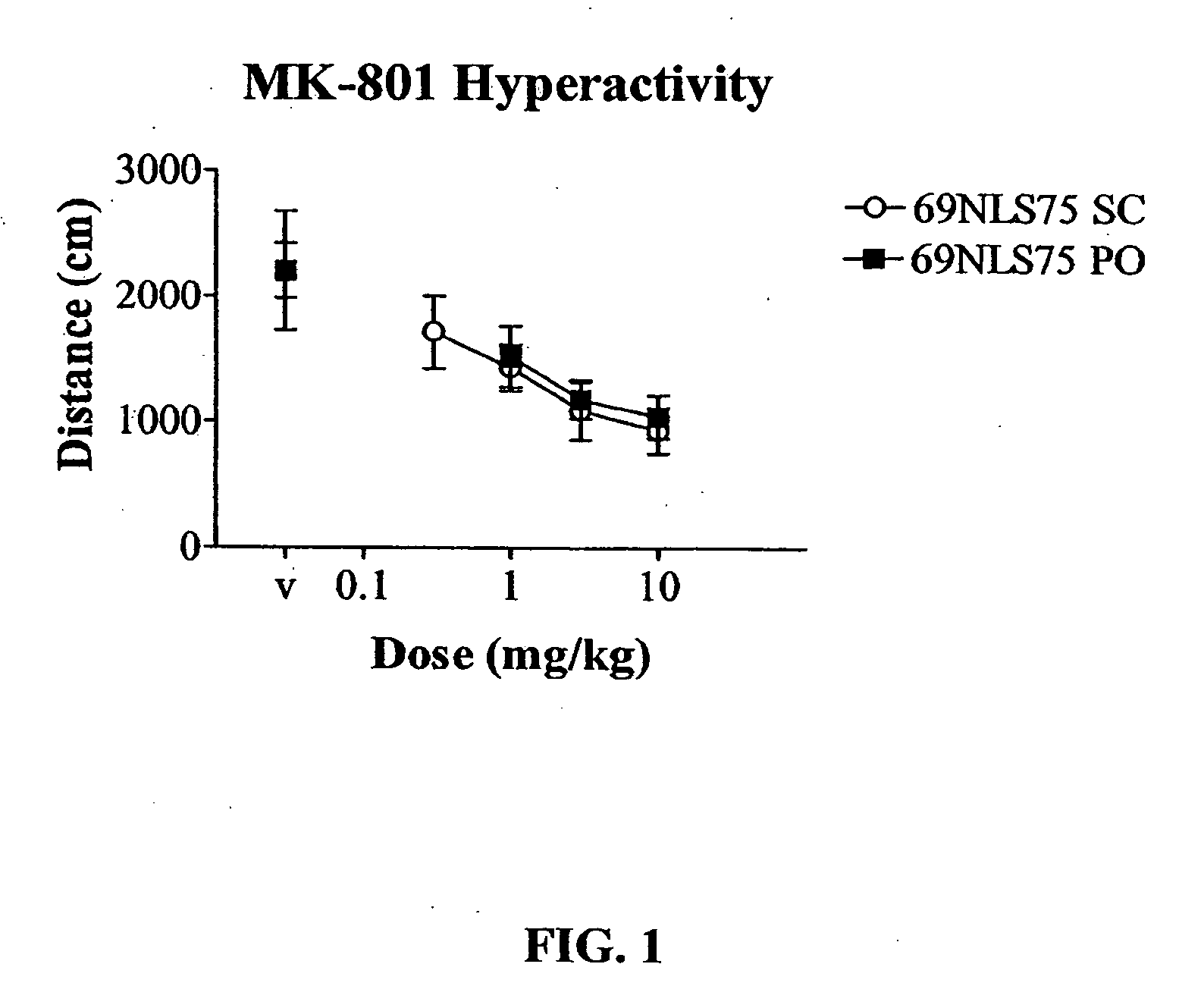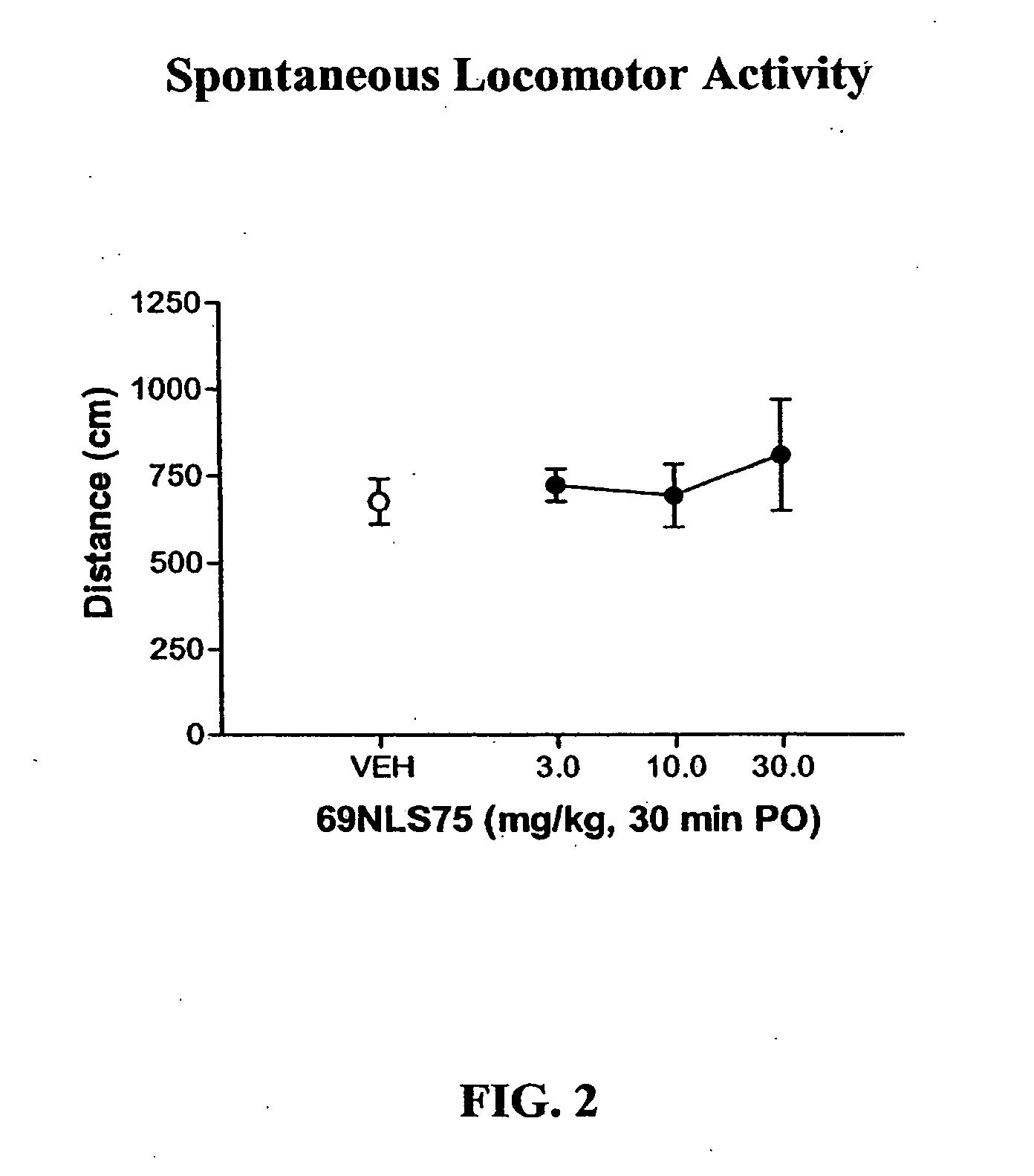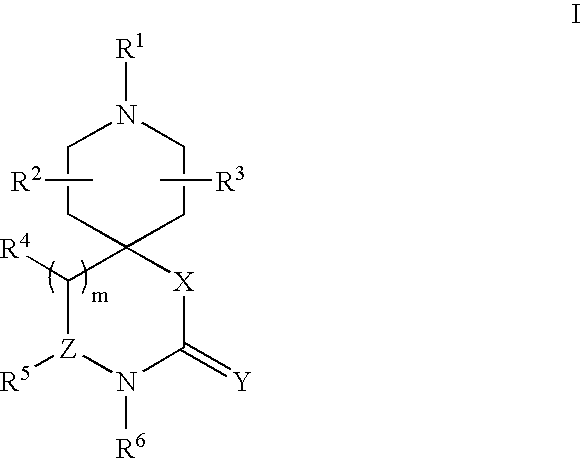Spiroazacyclic compounds as monoamine receptor modulators
a monoamine receptor and azacyclic compound technology, applied in the field of compounds, can solve the problems of reducing the societal productivity of individuals affected by this disease, and reducing the use of these compounds,
- Summary
- Abstract
- Description
- Claims
- Application Information
AI Technical Summary
Benefits of technology
Problems solved by technology
Method used
Image
Examples
example 1
Synthetic Chemistry
[0149] General methods. 1H NMR spectra were recorded at 400 MHz, whereas 13C NMR spectra were measured at 100 MHz with proton decoupling at ambient temperature. Chemical shifts are given in δ-values [ppm] referenced to the residual solvent peak chloroform (CDCl3) at 7.26 and 77.0 ppm and methanol (CD3OD) at 3.31 and 49.2 ppm. Coupling constants, J, are reported in Hertz.
[0150] Materials and solvents were of the highest grade available from commercial sources and used without further purification. Acidic ion-exchange solid phase extraction cartridges were MEGA BE-SCX from Varian.
[0151] General LC-MS procedure. HPLC / MS analyses were performed using either of two general methods (Method A or Method B).
[0152] Method A: Agilent HP1100 HPLC / MSD. G1312A binary pump, G1313A autosampler, G1316A column compartment, G1315A diode array detector (190-450 nm), 1946A MSD, electrospray ionization.
[0153] Chromatography: mobile phase: 8 mM ammoniumacetate in water / acetonitrile...
example 2
Pharmacological Data
Receptor Selection and Amplification (R-SAT) Assays.
[0236] The functional receptor assay, Receptor Selection and Amplification Technology (R-SAT), was used (with minor modifications from that previously described U.S. Pat. No. 5,707,798) to screen compounds for efficacy at the 5-HT2A receptor. Briefly, NIH3T3 cells were grown in 96 well tissue culture plates to 70-80% confluence. Cells were transfected for 12-16 hours with plasmid DNAs using superfect (Qiagen Inc.) as per manufacture's protocols. R-SAT's were generally performed with 50 ng / well of receptor and 20 ng / well of Beta-galactosidase plasmid DNA—All receptor and G-protein constructs used were in the pSI mammalian expression vector (Promega Inc) as described in U.S. Pat. No. 5,707,798. The 5HT2A receptor gene was amplified by nested PCR from brain cDNA using the oligodeoxynucleotides based on the published sequence (see Saltzman et. al. Biochem. Biophys. Res. Comm. 181:1469-78 (1991)). Large-scale tran...
example 3
In Vivo Pharmacology of 4-(4-Fluorobenzyl)-3-(4-isobutoxybenzyl)-8-methyl-1-oxa-3,8-diaza-spiro[4.5]decan-2-one (69NLS75)
Methods
Animals and Apparatus
[0238] Male Non-Swiss Albino mice (Harlan Sprague-Dawley) were housed (4 mice / cage) in rooms with temperature and humidity controlled and water and food (Harlan Teklad) freely available. Mice were kept on a 12-hr light:dark cycle. For locomotor experiments, plastic 20×20×30 cm activity cages were equipped with photocell beams (AccuScan Instruments).
Procedure
Locomotor Activity
[0239] For hyperactivity experiments, mice were treated with 0.3 mg / kg dizocilpine i.p. 15 min before the session. Mice were treated with 69NLS75 s.c. 10 min before the session or p.o. 30 min before the session and placed into the activity cages. For spontaneous activity, 69NLS75 was administered alone. Locomotor data were collected during a 15 min session without habituation in a lit room. Each dose combination was tested in a separate group of animals (n...
PUM
| Property | Measurement | Unit |
|---|---|---|
| pressure | aaaaa | aaaaa |
| pH | aaaaa | aaaaa |
| enantiomeric excess | aaaaa | aaaaa |
Abstract
Description
Claims
Application Information
 Login to View More
Login to View More - R&D
- Intellectual Property
- Life Sciences
- Materials
- Tech Scout
- Unparalleled Data Quality
- Higher Quality Content
- 60% Fewer Hallucinations
Browse by: Latest US Patents, China's latest patents, Technical Efficacy Thesaurus, Application Domain, Technology Topic, Popular Technical Reports.
© 2025 PatSnap. All rights reserved.Legal|Privacy policy|Modern Slavery Act Transparency Statement|Sitemap|About US| Contact US: help@patsnap.com



